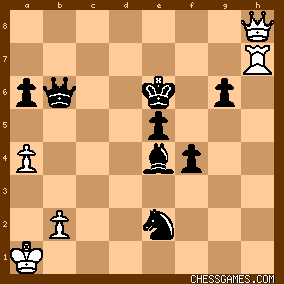Nov-26-19
 | | MissScarlett: The Field, April 1st 1911, p.613:
<This match commenced on Monday at one o'clock, and concluded at six o'clock. Cambridge winning the toss for move, took the White men on the odd numbered four boards, having thus the White men four times to Oxford's three. Oxford won the match, which should have been a draw as matters stood, viz., when time was called there remained only one unfinished game, and this being adjudicated upon by Messrs Hoffer and Ward, was given in favour of Oxford, the Cantab having thrown it away just a move or two before the call of time, when he had a won game. But for this mishap the match would have been drawn, as it should have been, for there is nothing to choose between the teams. By a curious coincidence this very game is the most interesting of the series, and both Messrs Davies and Wooldridge displayed considerable ingenuity.> Matters become even more interesting upon learning that Wooldridge hadn't thrown away the game - Hoffer and Ward were wrong and Black was still winning. After <42...Ne2+ 43. Kb1 Bxe4+ 44. Ka1 Qxb6 45. Nf7+ Kg7 46. h8=Q+ Kxf7
47. Rh7+ Ke6>, we reach:

click for larger viewand Black eventually (it's complicated) escapes the checks. But there's more going on. In the <Field> of April 1st, <42.Rxc1> was given, but that's even less winning than <Kxc1>; <42...Qxb6> can't be met by <43.Rc8+>, of course, because c8 is covered by the Bishop. So I checked the following week's column seeking elucidation, and found in the correspondents' section: <V.R.G. (Alvechurch). - It should be 42.K takes R, and Black cannot save the game.> It's no surprise that the <Field> columnist didn't pick up on the error in adjudication, because his name was Leopold Hoffer. So what did he suggest Black should have played instead of the 'hasty' <41...Rc1+>? The best line is <41...Bxe4+ 42.Nxe4 Rc1+> when the white Queen falls without any counterplay. But <Hoffer> preferred <41...Rd7> overlooking that <42.Nf7+> is fatal. I'm almost at the point wondering if there might be some further corruption of the game score. Instead of <36.Kxc2>, the impossible <36.Q to R6> is advocated, but I assume that's just a misprint for <36.Qd6>. The games scores of the Varsity match usually also appeared in the (London)<Standard>, but the <BNA>'s coverage only extends to 1909, so no comparison is possible. |





